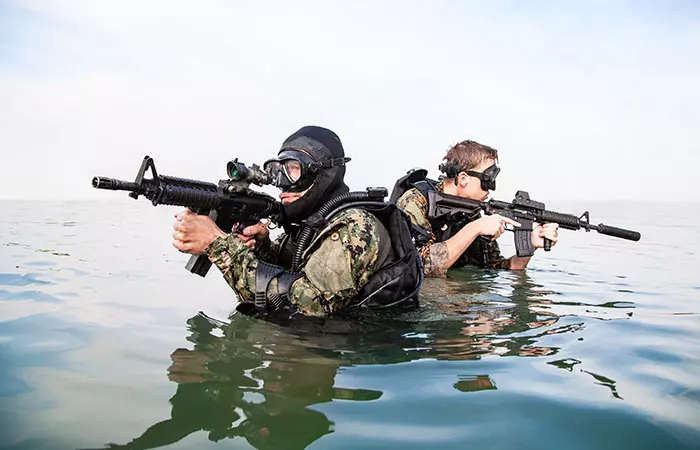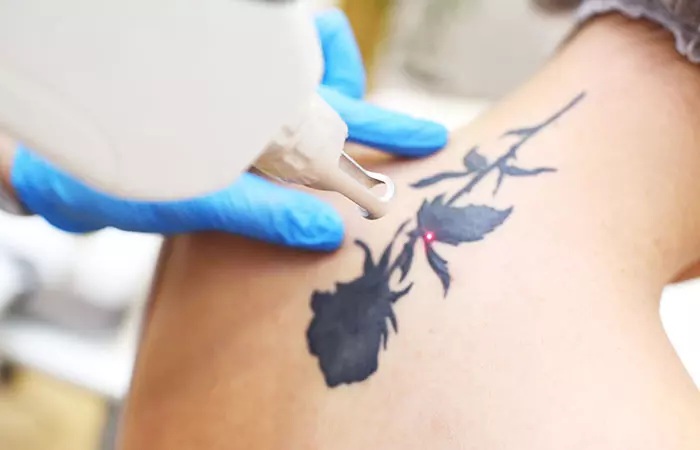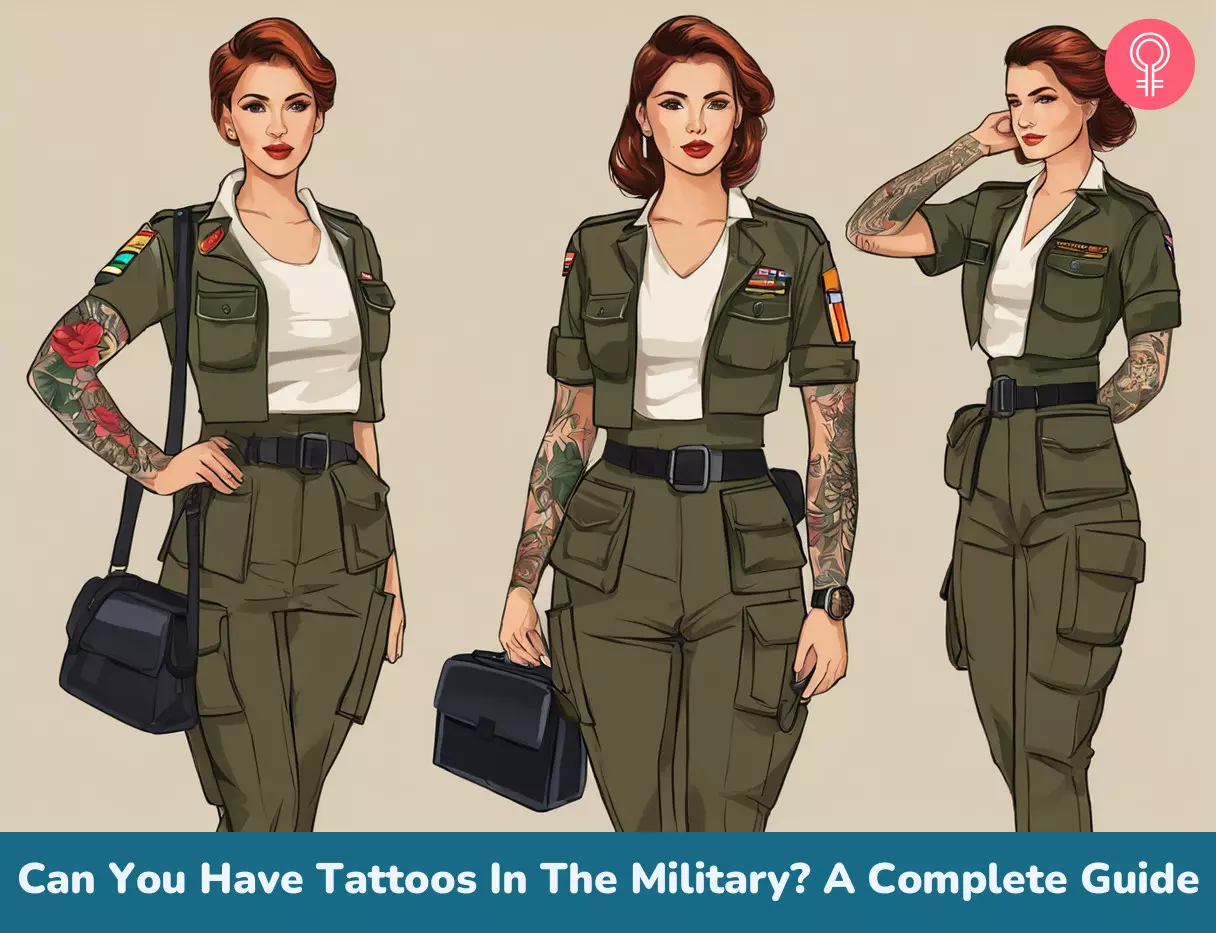
Tattoos are a way to express yourself and have freedom and sometimes a leftover from an explosive bender. However, for people who aspire to join the military or are already in the military, it is one of the most pressing concerns. Can you have tattoos in the military? Considering the increasing popularity of various tattoo ideas, especially among the younger generation, this concern is genuine. Restrictive tattoo policies have not only deterred many aspiring soldiers from joining the military but have also created challenges in the recruitment process and led to the loss of excellent army recruits.
However, there are changes to tattoo permission policies to accommodate active duty soldiers and maintain a disciplined military appearance. If you want to learn more about tattoos and armed forces recruiting, scroll down to find out.
Are you allowed to have tattoos in the military?
 Image: Shutterstock
Image: Shutterstock
It is a misconception that tattoos are not allowed in the military. That being said, there is no “yes/no” answer to the question “are you allowed to have tattoos in the military?”
The U.S. Government Accountability Office (US GAO) allows soldiers in almost all branches of the military to get tattoos. However, there are regulations regarding the size, placement, and content of tattoos.
All military branches, whether it is the U.S. Army, Navy, Air Force, Coast Guard, Space Force, or Marine Corps, have strict policies against tattoos that in any way involve drugs, sex, violence, or gang affiliation. Additionally, your body art may not promote sexual, religious, or racial discrimination.
It is important to understand the rules and policies regarding tattoos before joining the military. Check out the next section to find out.
Tattoo Regulations and Policies
Each branch of the military has its own set of tattoo rules and policies by which they vet recruits. Below are the tattoo policies that are followed in the Army, Navy, and Air Force.
Army Tattoo Rules and Policies
If you’re aspiring to join the military, tattoos on your wrist, face, head, ears, or neck aren’t your best friends. So, where can you get tattoos in the military? According to the updated Army tattoo regulations, you can get tattoos on your arms and legs, as long as they don’t show above the collar. And tattoos on your back and chest are also allowed.
The U.S. Army recently updated its policy on enlistment and hand tattoos and neck tattoos. Soldiers in the U.S. Army are allowed to have one tattoo on each hand that is no longer than 1 inch long. Tattoos on the back of the neck are allowed to be no longer than 2 inches long. One is also allowed to have a 1 inch long tattoo behind the ear. Additionally, a finger ring tattoo or finger tattoo is allowed as long as it is not visible when the hands are closed.

During World War I, soldiers had their military identification numbers tattooed on their bodies so that they could be identified in case of death or injury.
Tattoo regulations vary in the Navy. So, it just so happens to be your dream service branch, read more about the tattoo regulations of the U.S. Navy below.
Marine Tattoo Regulations and Policies
 Image: Shutterstock
Image: Shutterstock
The U.S. Navy has also updated its tattoo regulations and policies to attract potential recruits and retain talented individuals. There are flexible tattoo policies in the Navy that can help recruit those who are willing to serve.
Multiple tattoos or body markings of any length are permitted on arms and legs. Additionally, a single neck tattoo of up to 1 square inch and a single ring tattoo on the finger are permitted.
The United States Air Force is another lucrative branch that many would like to join. Read more about their tattoo policy below.
Air Force Tattoo Rules and Policies
The Air Force updated its tattoo regulations and policy in March 2016, stating that tattoos may not exceed 25% of the visible skin of a uniform. Tattoos on the chest, back, arms, and legs that remain beneath the open-collar uniform are considered acceptable body art. A single band tattoo no wider than ⅜ inch and placed above the finger joint and below the knuckle is acceptable. Additionally, there are no restrictions on the size or placement of tattoos on other tattoos that are consistent with official regulations.
These tattoo policies and military regulations can help you determine the ideal places to get a tattoo before you join your dream military branch. But what if you already have one? Find out below.
Military tattoo exemption
 Image: Shutterstock
Image: Shutterstock
A military tattoo waiver allows an individual with an unauthorized tattoo that does not meet military tattoo policy to join the military branch of their choice. One can apply for this process, but exemptions from the waiver are not guaranteed. Each military branch has its own tattoo regulations and policies, as well as the conditions for approving and reviewing tattoos. Applicants for service must convince senior leaders or officers and provide relevant information for the waiver process. They must consult with a recruiter about the current policy of their specific branch, submit all waiver application requirements, and wait for a decision after completing the waiver processes.
It is an option you can try if you want to keep your tattoo and pursue your dream career. If you can convince the department officials, you may be able to join the police force without having to remove your tattoo. While the decision depends on the assessment process and the officials, the following factors can work in the candidate’s favor:
1. Size
Less visible, light tattoos and simple tattoo designs are more often accepted than larger tattoos or facial tattoos.
2. Contents
Tattoos with personal content or cultural tattoos are acceptable tattoos. However, tattoos with controversial content may not be considered.
3. Documents
You will increase your chances of exemption if you can provide documents proving the special meaning of your tattoo.
4. Recording
A clean criminal record with no questionable past events can also work in the candidate’s favor.

American soldiers in World War II had “Death before Dishonor” tattooed as a symbol of patriotism.
Military tattoo exemption is an option. But what else can you do if your tattoo doesn’t meet military standards? Find out in the next section.
What can you do if your tattoo does not meet military standards?
 Image: Shutterstock
Image: Shutterstock
If you are determined to pursue a military career and you already have a tattoo that does not meet military tattoo regulations or the policy of the specific military branch you are applying to, then this is the second option you can choose:
Tattoo Removal
 Image: Shutterstock
Image: Shutterstock
This is a permanent option that will remove your tattoo completely. Most people opt for laser tattoo removal, which removes the tattoo completely in multiple sessions. However, it is a costly and time-consuming option and may not be suitable for people who are attached to their tattoos.
Tattoos are a way to express yourself. However, they are a concern for the aspiring enlisted in the armed forces. While tattoos are not strictly prohibited in all branches of the military, there are different rules surrounding the topic of body markings in the U.S. Army, Navy, Marine Corps, Air Force, or Coast Guard. Each branch has its own rules governing the placement and content of tattoos. Tattoos on the face, head, ears, and visible parts of the body are strictly prohibited in almost all branches, while eligible tattoos on legs and arms that remain under the uniform are permitted. However, if you got a tattoo before joining the armed forces, you can apply for a military tattoo waiver or have it removed.
Frequently Asked Questions
Does the military pay for tattoo removal?
No, there is no provision requiring the military to pay for tattoo removal unless it is a medical case.
Are military special forces allowed to have tattoos?
Yes, soldiers in special forces are allowed to have tattoos. However, they are not allowed to have them on their face, neck or hands. They are not allowed to have ring tattoos on their fingers or on parts of their body that are visible after wearing the uniform.
What happens if you get a tattoo that is not allowed in the military?
The consequences of getting a tattoo without permission within the military can include: supervision and reprimand, reduced duties or loss of privileges, administrative separation, Article 15 penalties including fines, additional duties or demotion, or even court-martial in rare cases.
Key Points
Tattoos are allowed in the military, but with restrictions on number, size, and placement. Most branches of the military allow tattoos on the arms, legs, back, and chest. However, it is best to check the regulations of your particular military branch before signing up for service. A military tattoo waiver is an exception that can be granted to those with an unauthorized tattoo that violates regulations.
Image: Stable Diffusion/StyleCraze Design Team
The U.S. Army has recently relaxed its tattoo policy and restrictions on tattoos for recruits and prospective candidates. Watch this interesting and informative video to learn about the current updates to the military’s tattoo policy.
Was this article helpful? ReviewerAuthorEditorFact Check
![]() Brik Rangel is a highly skilled tattoo artist with 12 years of experience in the field. She specializes in transformative tattoo makeovers and cover-ups. After honing her craft in São Paulo, Brazil, she now works as a tattoo artist and manager at Manhattan Tattoos in New York and as a tattoo artist at Divine Tattoos in New Jersey.
Brik Rangel is a highly skilled tattoo artist with 12 years of experience in the field. She specializes in transformative tattoo makeovers and cover-ups. After honing her craft in São Paulo, Brazil, she now works as a tattoo artist and manager at Manhattan Tattoos in New York and as a tattoo artist at Divine Tattoos in New Jersey.
Read Brik Rangel’s full biography
![]() Gazala Ansari is a beauty and lifestyle writer with two years of experience. She writes on relationships, makeup and lifestyle and holds a Bachelor’s and Master’s degree in English Literature from Central University of Jharkhand.
Gazala Ansari is a beauty and lifestyle writer with two years of experience. She writes on relationships, makeup and lifestyle and holds a Bachelor’s and Master’s degree in English Literature from Central University of Jharkhand.
Read the full biography of Gazala Firdos Ansari
![]() Eshna is an associate editor and certified skin care coach. She has over three years of experience, a triple major bachelor’s degree in psychology, English and journalism from Mount Carmel College, Bengaluru, and a master’s degree in psychology from Sampurna Montfort College, Bengaluru.
Eshna is an associate editor and certified skin care coach. She has over three years of experience, a triple major bachelor’s degree in psychology, English and journalism from Mount Carmel College, Bengaluru, and a master’s degree in psychology from Sampurna Montfort College, Bengaluru.
Read the full biography of Eshna Das
![]() Shreya is a beauty and lifestyle writer with two years of experience. After graduating from Christ University, Bengaluru, she started as an intern writer for a non-profit organization, Bhumi. After that, she wrote for a progressive content website.
Shreya is a beauty and lifestyle writer with two years of experience. After graduating from Christ University, Bengaluru, she started as an intern writer for a non-profit organization, Bhumi. After that, she wrote for a progressive content website.
Read Shreya Mukherjee’s full biography
Leave a Reply